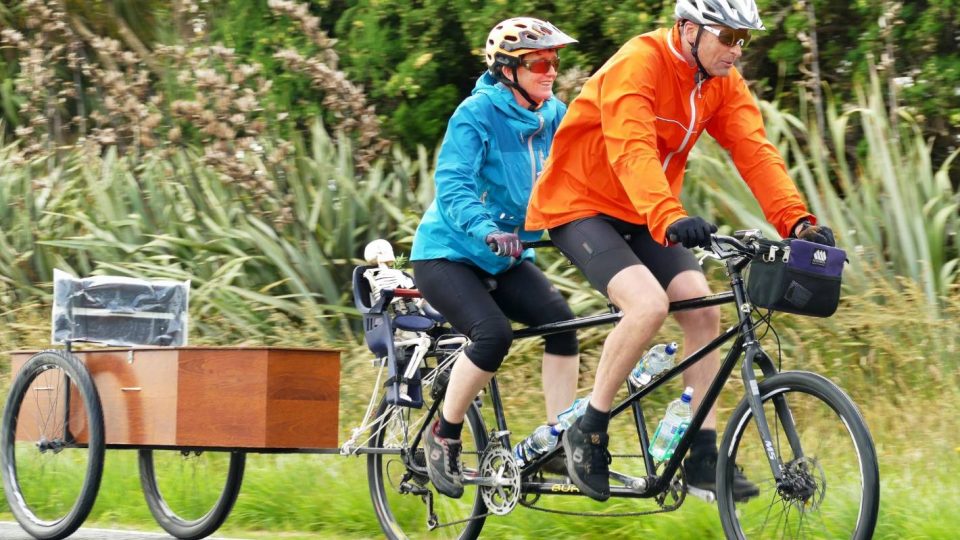John Hawkins/Stuff
Julian and Camilla Cox towing a coffin with their tandem bike through Southland on their way to Wellington.
When Julian and Camilla Cox finally arrive at Parliament, after biking the length of the country, they intend to drop off their coffin and leave.
It’ll then be up to the Government to sort out the skeleton they have called Hope, Julian said.
The Dunedin couple have taken to the roads to raise awareness about how the Government is funding drugs.
READ MORE:
* National ventures into vacated Labour territory with cancer announcement
* Beefed-up Pharmac funding would be welcome Budget boost
* Living with advanced breast cancer: Diary of a broken-hearted whānau
* Health organisations join calls for a review into government drug-buying agency
The skeleton, on the coffin they are towing, represents Kiwis who are dying because they don’t have access to life-saving medicines readily available overseas, the couple says.
Riding a tandem bike for the next 18 days, they have caught a lot of attention on the roads since they left Dunedin on Friday. On Sunday, they were battling strong winds at Winton, in Southland, and planning to continue their journey north.
The skeleton represented more than 250,000 sick New Zealanders desperately fighting for access to modern treatments the Government’s Pharmac cannot fund, the pair said.
The couple are also collecting signatures on their journey for a petition organised by Patient Voice Aotearoa that is asking the Government to do an external reform of Pharmac.
“New Zealand only spends only 5 per cent of our health budget on medicines compared to the OECD average of 16 per cent. This is inhumane, unfair and has to change,” Julian said.
Their daughter Rachael has cystic fibrosis and suffers from CF-related diabetes and pancreatic insufficiency.
“She needs modern drugs in order to prevent her lung capacity from deteriorating further and putting her life at genuine risk, but none are currently funded here,” Julian said.
“We should not have to consider to moving to Australia to access modern drugs,” Camilla said.
Pharmac has agreed to put one modern drug Kalydeco on its wait list for funding but only as a “low priority”, Julian said.
Since starting their journey, they’ve had quite a bit of reaction from people seeing them on the road.
“What we’ve found is that a lot of people have started to talk about how the health system affects them. And, we’ve had cars tooting, and a few people doing ‘double-takes’ when they notice the coffin,” he said.
“People are really positive about what we are doing and why. The issue touches so many people. You hear of people with cancer that can only manage to get treatment because they got on a clinical trial,” Camilla said.
“We want the Government to fund medicines properly and bring us into alignment with other countries. People are desperately trying to find drugs from other countries, people should not have to be living like that in a country that calls itself first world,” she said.
They hope to arrive in Wellington on January 22.


